 Image Credit - @exiledsurfer
Image Credit - @exiledsurfer
On August 15, a group of online activists known as Anonymous showed that their words and deeds can indeed move beyond cyberspace. In response to BART's August 11th attempt to foil protest with a shutdown of their wireless communication system, Anonymous launched OpBART to protest these actions. Over that weekend, Anonymous lit up, defacing myBART.org and commandeering thousands of user names from the woefully insecure BART network. This is par for the course for Anonymous.
The events broke into the mainstream news. On Monday morning it was on the front page of the San Francisco Chronicle and other papers. Monday August 15th was X day for OpBART. With Twitter and social media facilitating the communication, those who care about free speech around the world watched to see if Anon could actually take their action to the streets.
Anonymous successfully carried out their intention. This was a rare pubic appearance that echoed some of their first actions against the Church of Scientology. Shawn Gaynor, writing for the San Francisco Bay Guardian noted how this protest was “the most civil of civil disturbances the city has seen surrounding the police brutality issue”.
Anonymous, who defaced BART’s external website now showed their face publicly as activists. Across time and space, struggles for justice from the past converged in SF with present action. Online activism led by the meme of Guy Fawkes masks from the film V for Vendetta emerged and entered the frame of conventional activism. People of all ages came. Ordinary people in nonviolent protest against BART violence and censorship showed solidarity with the group.
While Madrid is traditionally empty in August, the city is now literally packed with Catholic pilgrims of all ages, who have come from all around the world to attend the World Youth Days, presided by the Pope Benedict XVI. Authorities estimate that around 1.4 million people have flooded the city. From the very beginning the event has created resistance in the general public, as the investment of approximately 70-100 million euros is seen as exaggerated, in a time when politicians are demanding austerity measures for a country facing severe economic recession. They criticize, for example, that the centre of Madrid will be closed to traffic for more than four days, causing a lot of problems for normal citizens who have to work. Furthermore, the pilgrims have been given benefits that any unemployed Spaniard would desperately need: they have been given places to stay for free, food for free and while public transport in Madrid went up by 50% this month, being a pilgrim gives you a whopping 80% discount for all travels. This has caused major irritation in an already angry population, who are demanding answers as to why a constitutionally secular country should give this kind of support to any religion, while at the same time neglecting it’s own citizens.
The Popular March to Brussels that left the Puerta del Sol of Madrid on July 26th, is now at the Pyrenees. Until today, over one hundred people have decided to go to Brussels. The Marchers are, among other places, from Italy, Greece, Germany, France, Russia, USA, Cuba, Colombia, Mexico, Tunisia, Poland and England. Women and men of all ages are sharing this experience.
After twenty-three days on tour along towns and cities in Northern Spain, on Wednesday August 17th, early in the morning and from the city of Irun, the March will cross the border. Then, they will meet their counterparts in France at Baiona, where a warm welcome is prepared.
On Monday, August 8th, also the Mediterranean March to Brussels left the city of Barcelona in their journey to the Belgium capital. The Marchers are currently 21 and tomorrow it’s expected that several people will join up them. Besides, 12 participants have already confirmed their presence in the neighbor country, who will join up the March to accompany them to cross the border.
While at Netroots Nation 2011, I had the privilege of speaking to Lieutenant Dan Choi, who served in the US Army infantry, went to war in Iraq and graduated from West Point with a degree in Arabic.
Choi was kicked out of the military under "Don't Ask, Don't Tell" (DADT) about one year ago. At Netroots Nation, Choi celebrated his one year "anniversary or birthday" as a civilian. He also noted that despite DADT being repealed there are still soldiers getting kicked out of the military for being gay.
The US government is putting Lt. Dan Choi on trial August 29 for "demonstrating in front of the White House in November of last year." Choi refuses to plead guilty or accept any kind of deal.
“I believe this Administration is making a grave mistake in limiting the areas, times and manners that free speech should be allowed," declares Choi. And adds nobody should be intimidated into not protesting.
I spoke to Choi the day after he had gone with Hamsher to support Bradley Manning Support Network co-founder David House, as he went before a federal grand jury investigating individuals supportive of alleged military whistleblower Bradley Manning and WikiLeaks. Choi says House is an "American hero" and "our situations are exactly the same."
Today at 13.30 hours the Spanish national police attacked protesters who had been occupying the steps of parliament since last night. This comes after the official page for the camp in Valencia called for a protest before the Corts Valencianes, the main legislative organ of the Comunitat Valenciana. Today the new members were to be sworn into their charges after being elected on the past 22nd of May, and many of them, mostly belonging to the right wing Partido Popular, did so even though they are currently facing serious corruption charges.
Despite the obfuscation of information by major outlets in traditional media and Internet, the movement born in Europe on the past 15th of May is spreading all across the continent, each day with more intensity and popular support. The repercussions, both in economic and political scenario are still unknown, in the same way the effects of the Cablegate episode of November 2010 were difficult to apprehend in that date but step by step shows its importance to contemporary society. The revolution lead by the European youth holds all Western economical and political structures as its enemy and is the type of social movement that does not have its shelter- an essential characteristic of a revolution. Relevant information of the gatherings, protests and projects are provided uniquely by independent media, and in some occasions these are being boycotted. The website for the Real Democracy Now platform in Berlin claimed that they were attacked, and the independent media site, www.europeanrevolution.com was finally put offline illegally, after having been blocked via DNS in, at least, France and Belgium. Below is a recollection of information from past events in different countries.
 Bradley Manning moving to Fort Leavenworth
Bradley Manning moving to Fort Leavenworth
'US officials' say private Bradley Manning is being moved to Fort Leavenworth in Kansas according to the Associated Press. An announcement is expected tomorrow at the Pentagon. "The officials spoke on condition of anonymity because the move has not yet been made public."
Fort Leavenworth is home to the United States Disciplinary Barracks, the U.S. military's only maximum-security facility, which houses male service members convicted at court-martial for violations of the Uniform Code of Military Justice. According to Wikipedia, only enlisted prisoners with sentences over five years, commissioned officers, and prisoners convicted of offenses related to national security are confined to the USDB. Manning is still awaiting trial. Midwest Joint Regional Correctional Facility, opened October 5, 2010, is also on the Fort Leavenworth site and may be the one Manning is headed to.
Press briefing at the Pentagon contained the following:
Wednesday's forum on the tribulations surrounding WikiLeaks was timely and a much-needed shot in the arm for political discourse in Australia.
Framed through the lens of Julian Assange and WikiLeaks' David and Goliath struggle against the machine, the dominant theme of the night was the questioning of Australia's political identity and sovereignty in its unbalanced relationship with the United States, and how this imbalance has manifested itself in the lack of political and legal support provided to its citizens. Hence, some parallels between Julian Assange and previous Gitmo detainees David Hicks (present in the audience) and Mamdouh Habib were repeatedly made. On some levels, this may be seen as incongruous - Hicks and Habib were terror suspects, whereas Assange, despite hostile rhetoric, has not been accused of terrorism by a prosecuting authority - but the import of drawing these parallels is the same.
Open to the public, the seats inside Sydney's stately Town Hall filled up quickly, no doubt due to the caliber of the panelists rather than the rain pouring outside. The night's proceedings were emceed by Mark Kostakidis, veteran of Australian public broadcaster SBS. The speakers were the award-winning journalist John Pilger, member for Australian Federal Parliament and famous Iraq war whistleblower Andrew Wilkie, and tireless human-rights campaigner Julian Burnside QC.
Indeed, there were no "hawks" on the panel to provide opposition to the overall theme of libertarianism - not that the audience present minded, for this forum was a chance to escape the endless diatribes of said hawks, who are already in the privileged position of being able to pollute the airwaves, print and the web, stifling such fora under hackneyed pretexts of "national security" (to name but one).
Measuring the Possibilities: Unlikely, although sharing critical conditions that ignited revolutions in Arab nations
Possibilities of ‘North Korean Jasmine Revolution’ based on similarities and differences between the revolution-flaming countries and North Korea, with a glance on the country’s current IT environment, are discussed here.
Similarities:
-Grievances among young soldiers due to decades of food crisis
-High percentage of the youth among the population
Food crisis has been a chronic, serious problem in North Korea since the 1990s’ infamous famine which had taken about 2.8 million lives. The crisis has caused not only huge annual deaths by starvation but also widespread malnutrition which makes the people extremely prone to illnesses and epidemics that almost always lead to death. According to the Report of 2010 published by Amnesty International, about 9 million people suffered ‘severe food shortages’ in the year. International food aids, including the emergency operation of World Food Program, have dropped violently after the series of nuclear weapon tests.
Working in the national army has been one of the most honored jobs in North Korea. However, the army has failed to escape the wave of nationwide food shortage; there have been brigade-scale disobedience inside the army, including the officially reported one from the 47th brigade in Hwanghae district working on nuclear project, calling for enough food.
Would revolutions and movements in North Africa and Middle East be able to fuel similar ones toward democracy in North Korea? After the fall of Hosni Mubarak, North Korea’s already harsh censorship has been intensified against the use of mobile phones to block any news about the topic. However, amid the growing grievances due to desperate food crisis, small-scale protests have burst out around the country recently. Part one will roundup what’s reported so far about North Korea in relation with the effects of the revolutions.
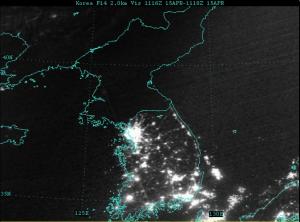
A nighttime satellite photo of the Korean peninsula, showing almost no sign of electricity provided in the North.
Source: DailyTech
Spreading and blocking the news; an ongoing battle
North Korean defectors and South Korean military have tried to send news to the North, including news of recent revolutions, by millions of air-drop leaflets. Such attempts became politically sensitive actions which attracted many criticisms, including worries that the action might lead to another bombing similar to the one that hit the Yeonpyeong Island last November. On 27th February, North Korea sent an official notification in the name of the North’s chief delegate to inter-Korean general-level military talks, warning that it would ‘fire aimed shots’ against ‘the spots of propaganda’(Source). North Korea was reported to not have broadcast anything about the revolution in Egypt until at least the 22nd of February.
North Korean defectors secretly distribute 'Stealth USB' to the North
Julian Assange has agreed to address the Cambridge Union on 15 March, reports the student paper The Tab.
The Union, officially the Cambridge Union Society, is a debating society founded in 1815 and is distinct from the student union. In addition to its weekly debates, it welcomes distinguished speakers from around the world.
The event will be open to Union members only. There is no word yet whether it might be otherwise transmitted.
Via @MarksLarks on Twitter
Systematic Corruption ruptures Vietnam with inequality
Since the mid-1980s, the time when Vietnam launched the ‘Doi Moi (industrialization)’ project to boost the national economy, Vietnam has recorded remarkable GDP increase rate, 7 to 8% a year. However, the economic inequality gap and government debts are huge, and show no sign of shrinking.
Primary reasons for the problems lie in the structure of the ‘industrialization’. The only legal political party, the Vietnam Communist Party, utilized state owned enterprises(SOE) as useful tools which enable the government to take a firm grip on the state economy. In a rare thesis discussing the privatization of the Vietnamese economy, Fredrik Sjöholm pointed out that it’s actually a state takeover of economy in disguise of ‘privatization’; about one-quarter of state revenues come from SOEs and the state can take control of any SOEs by having ‘minority state ownership share’(Sjöholm, 2006)
Commonplace collusion between politics and economy, interwoven through shares, squandered bailout money and venal practices in the name of ‘industrialization’, generated astounding breeding ground for corruption and rapidly increasing debts. The ‘industrialization’ process had few constructive plans behind it, which produced obfuscated ownership responsibility while working on ad hoc economic strategies. This opened the door for private, often political, actors to ‘hijack’ the real control of the firms.
Despite the fact that the communist government firmly controls the Internet and blocks any web sites that might be any ‘threat to national security’, the Internet silently mends the fire of dissent voices simultaneously around Vietnam.
Courage cannot be ‘centralized’ – Farmers protest against arbitrary land seizures with the help of Internet
In a tightly controlled, Facebook-blocked country, Vietnamese farmers marched out to the Ho Chi Minh City, the country’s second largest city and a national economic hub, to resist the government’s decision to seize their land.
Due to the centralized economy, government authorities are sole legal actors who can switch legal status of any land. Besides, the legal procedure of dealing with various different land rights of the government and farmers are extremely complicated, which becomes the central loophole allowing public officials to blur the line where exact responsibilities lie.
Exploiting this, lots of corrupt officials can take away seemingly profitable lands, handing tiny amount of compensation money to the land owners. The victims mostly fail to find the proper government authorities to get the fair compensation due to the blurred responsibility.
Government officials have been arbitrarily ‘robbing’ the lands as huge ‘development plans’ have swept the major urban cities into the swirl of dazzling real estate speculation. The real estate prices have hit thousands of dollars per square meter, which made both cities involved in the ‘Most Expensive Cities in the World’ list. However, Vietnam has the lowest real estate transparency index among 15 countries in the Asia-Pacific region.
Violence has continued today in the economic centre of Ivory Coast, the south-eastern city of Abidjan, and has left one dead after clashes between protesters and police forces began early in the morning. Today most of the businesses in the city remain paralyzed and the BBC reports that the La transmission centre of the national television was “burnt down, but is working again, even though the video is of poor quality”. Political tensions over the outcome of the presidential election past November, when the candidate from the opposition Alassane Ouattara accused Laurent Ggagbo, president since 2000, of fraud, have given way to widespread violence in most of the country.
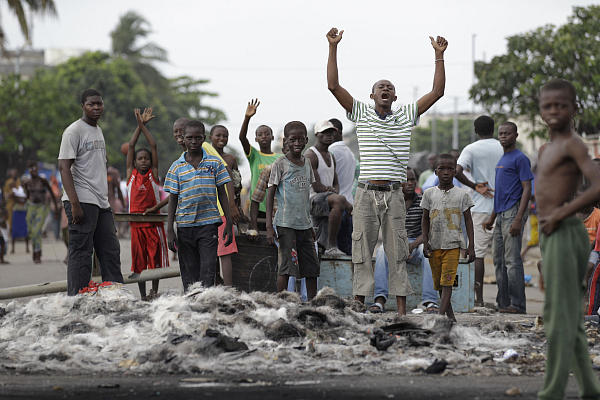
Several days after the official deadline for the results had expired, the Independent Electoral Commission for Ivory Coast claimed Ouattara as the winner with 54% of the votes. The country’s Constitutional Council, however, declared that the commission had no right to publish the results, having missed the deadline to do so. The President of the Council, Paul Yao N’Dre, also said they had decided to nullify around 500,000 votes coming from pro-opposition areas in the north of the country, alleging that the violence and tension that occurred there during the election invalidated the results. They therefore gave a marginal victory to Ggagbo, with a slim 51% of the votes. Both candidates claim they have been sworn into office. The U.N., along with most of the international community, has sided with Ouattara, and imposed sanctions on the Government, calling Ggagbo to step down. Ouattara is known to have strong connections with the West: he studied economics in the U.S. and worked with the International Monetary Fund as an analyst.
MADRID - Today the auditorium of the Reina Sofia museum in Madrid hosted a debate between the chief editors of the five major newspapers involved in cablegate: Javier Moreno from El Pais, Alan Rudbridger from The Guardian, Sylvie Kauffmann from Le Monde, Georg Mascolo from Der Spiegel and Bill Keller representing The New York Times. The theme was the future of journalism in the new global context set by Wikileaks.
We live tweeted the event here.
There was plenty of expectation, and early on in Twitter trends users were wondering if we would see a true discussion and not an orchestrated charade. This was important as most of the audience was made up of young reporters and students on assignment from their Universities: if the debate was to be centered on the future of journalism and its new model then the way it was to be carried out had to be convincing for the future players present. It seemed, however, that the organizers had planned on trying to have a big impact on the future generations, as they lined up students of a journalism Master sponsored by El Pais behind the main participants, though it was still unclear if they would be allowed to join in the debate. As they went in, the viewers were given a piece of paper each, in which they were supposed to write down a question addressed to one of the five editors. It is a shame that even though the scene was perfectly set for an interesting and enriching discussion, full of young people ready to carry the torch when their time comes, it turned out to be sterile: no participation was allowed from and the master students were a little bit more than a stage prop.

Tal al-Mallouhi was arrested in Syria in December 2009, and yesterday, at 20 years old, was sentenced to five years in prison for spying, an action condemned by the Committee to Protect Journalists. She had written blog articles saying she wished to play a role in shaping the future of Syria, and asking US president Barack Obama to do more to support Palestine. She was charged with "revealing information that should remain hushed to a foreign country". An official told Al Jazeera she "deserved 15 years in prison but her sentence was commuted considering her age".
PJ Crowley, of the US state department, "sharply criticized" Syria's handling of this case. Obama recently interfered in a similar case in Yemen, that time demanding that a Yemeni journalist remain in prison for reporting the truth about a US attack in Yemen that killed 55 civilians.
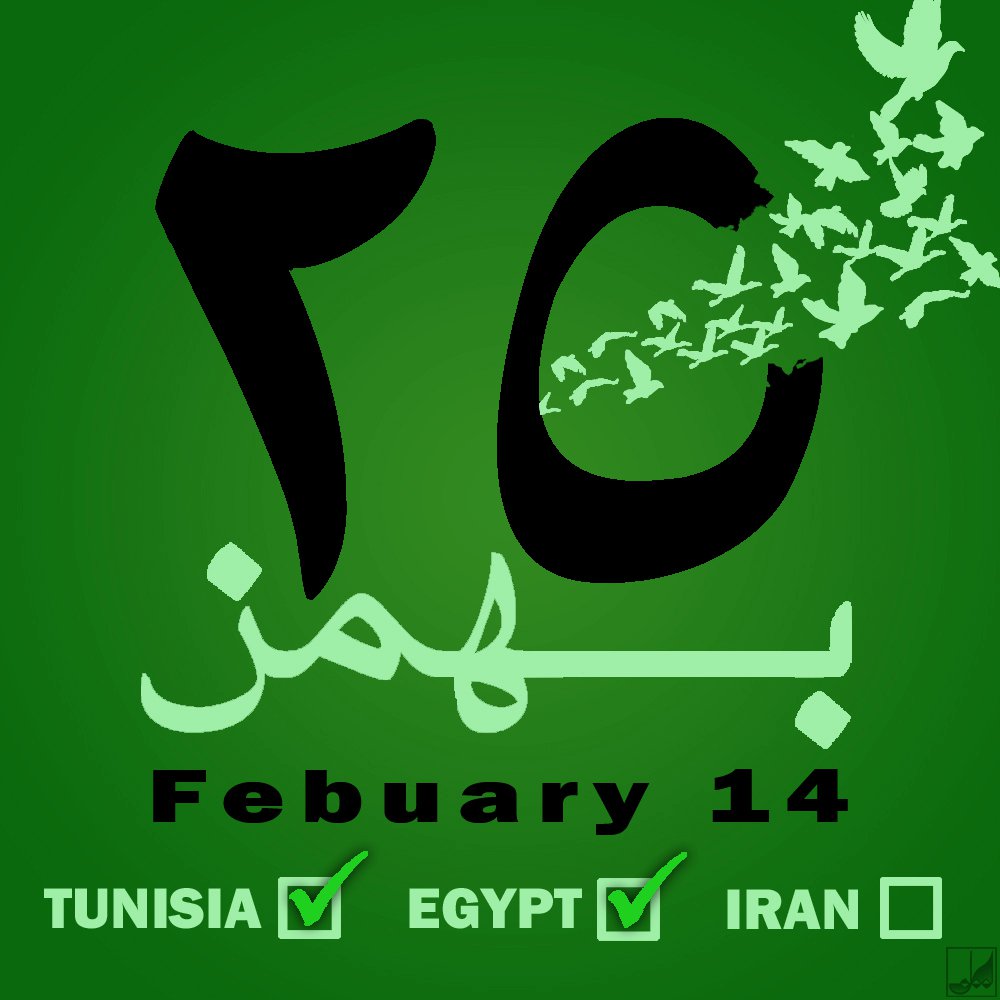
On Friday, the Iranian state commemorated the 32nd anniversary of its Islamic Revolution with victory parades, while simultaneously applying force in an attempt to crush any impetus by Iranians to take part in demonstrations planned across the country on Monday.
On Thursday, WL Central reported on the Iranian regime's continuing crackdown in response to Mehdi Karroubi's and Mir Hossein Mousavi's call to rally on Monday, 25 Bahman [February 14] "to show solidarity with the popular movements in the region, particularly the freedom-seeking movement of the Tunisian and Egyptian people against their autocratic governments." (Translation Source: Radio Free Europe)
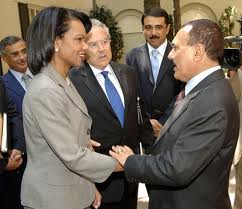 Protesters in south Yemen called for the secession of the once independent south today. Security forces were out early in the day with tanks and police to force protesters back inside. Scores of protesters were moved off of the streets of Aden, but dozens managed to get out in Crater, Khor Maksar, and Al-Mansura, and several hundred people in Zinjibar. Police in Al-Masura, fired warning shots and tear gas. Some reports say thousands of protesters were out in all provinces.
Protesters in south Yemen called for the secession of the once independent south today. Security forces were out early in the day with tanks and police to force protesters back inside. Scores of protesters were moved off of the streets of Aden, but dozens managed to get out in Crater, Khor Maksar, and Al-Mansura, and several hundred people in Zinjibar. Police in Al-Masura, fired warning shots and tear gas. Some reports say thousands of protesters were out in all provinces.
As WL Central reported on February 1, President Ali Abdullah Saleh had announced that he would step down after his second presidential term expires in 2013. Subsequent cables released by Wikileaks indicate that may have been more of a prearranged concession to the US than to the protesters. Cable 05SANAA1790 from June 2005 says regarding Saleh, "Domestically, however, he has run-out of reforms he can implement at no political cost to himself. Increasingly anxious about upcoming Presidential elections, and already preoccupied with succession, it is unlikely Saleh will allow a viable opposition candidate to challenge him in 2006. The visit is an opportunity to pressure Saleh not to amend the constitution so he may run again in 2013 by praising him for bringing Yemen to the point where he can rely on the system in place to produce a legitimate successor. The inducement here might be a public show of support via a greater role in public fora such as the G-8."
Abdul Ilah Shayi
[UPDATE No. 2 2011-02-10 8:49 EST]
Guardian reports that the BBC confirms its Persian TV service is being jammed tonight inside Iran, following its coverage of events in Egypt. BBC technicians have traced that interference and have confirmed it is coming from Iran. (Source: Guardian)
Peter Horrocks, director of the BBC's World Service says:
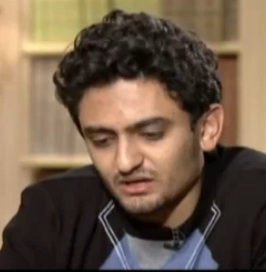
For many in Tahrir Square, his presence was why they had come out February 8. Ghonim, who was released on February 7 by authorities, played a key role in organization demonstrations against the regime before being arrested in late January.
He was seized in the Egyptian capital when he was with tens of thousands of protesters in the Square. Al Jazeera reported Ghonim was "picked up by three plainclothes men on the street, pushed into a car and taken off for interrogation by state security members."
Ghonim has tried to minimize his role in the revolution. He said after his release, "Please don't make me a hero. I'm not a hero. I have been asleep for 12 days."
Theme by Danetsoft and Danang Probo Sayekti inspired by Maksimer